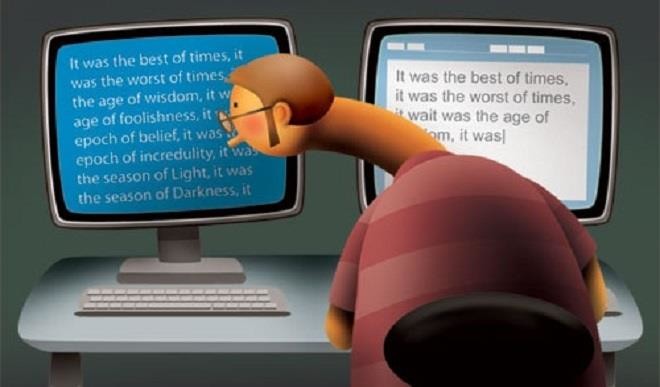Plagiarism in ‘new media’
“Welcome to facebook, where people will steal your work and get more likes than you.” Sani Ammani. Plagiarism is the practice of taking someone else’s work or ideas and passing them off as one’s own. According to Wikipedia.org, “ it is the wrongful appropriation and stealing and publication of another author’s language, thoughts, ideas, […]


“Welcome to facebook, where people will steal your work and get more likes than you.” Sani Ammani.
Plagiarism is the practice of taking someone else’s work or ideas and passing them off as one’s own. According to Wikipedia.org, “ it is the wrongful appropriation and stealing and publication of another author’s language, thoughts, ideas, or expressions, and the representation of them as one’s own work.”
‘New media’ is a means of mass communication using digital technologies such as the internet, this includes but not limited to online newspapers, blogs, wikis, social media {Facebook, Instagram, Twitter}, e.t.c. simply put, new media is sharing information to the public using the internet.
Copyright is a form of protection provided by law to the creators of original works, it is a right excluding others from copying the original creation of writers, artists, musicians, performing artist. These artistic and literary creations are considered intellectual property of the creator, it is a result of his/her intellect, and so his/her property.
The law of copyright, does not protect news, ideas, and general information, that is why we find breaking news with same headline and story in different media platforms, these are results of events, facts, happenings e.t.c.
News, ideas and information are different from artistic and literary creation of an author, e.g articles, picture-quotes, songs, et al. These artistic creation involves a lot of hard work, dedication, commitment, and brainstorming to come up with, it is discouraging when one finds such creation of his/hers being reproduced to the public without acknowledging the author or source.
With the advent of technology, ‘copy and paste’ has become a gateway to sharing information without reference to the author, this nonchalant attitude to sharing information on the internet without acknowledging the source, is the reason Nigerians discredit the news they find on social media.
It is common nowadays to see bloggers posting artistic and literary creation of another on their site like it’s their own creation, without recognizing the author, this creates a two-way negative effect, it dampens the reputation of the blog if discovered, and robs the creator of recognition.
There is nothing wrong in sharing artistic and literary creation of another {that is the essence of its creation in the first place}, the problem however lies when the creator is not acknowledged, it is an infringement on the intellectual property of another.
One thing with the copy and paste, is that the broadcaster reproducing the creation without acknowledging the creator, might get more shares and likes than the originator of the creation. Copy and paste without reference to the originator kills creativity in the media industry, why put in your best to create a work, when another with more page followers can share your work and get more likes than you, the creator?
To my mind, ‘copy and paste’ otherwise known as lifting contents from another media platform without their consent, and pass it as the creator, is a product of laziness and lack of originality. It is a disheartening trend that goes on rampantly on the ‘new media’ without recourse to media ethics, a professional media personality would always acknowledge the creation of another.
Sadly, what we have on the ‘new media’ are Nigerians who care less about media ethics, as a matter of fact, are even unaware of the media ethics, and so go to these online platforms and make publication in violation of the copyrights law. These impeders of creation are only interested in the traffic the literary work would bring to their site, robbing another of his/her glory and recognition.
In the law of copyright, an author whose copyright is infringed may sue for the infringement and seek for the following reliefs; general damages, injunction, account, conversion rights, e.t.c. With the countless act of intellectual theft going on the new media, it is a surprise that we are yet to see cases instituted as regards breach of infringement. When asked, one online creator of content says, “I don’t think the Nigerian courts will listen to anybody whose artistic creation is stolen on facebook.”
Well it is important to state, that unlike other types of intellectual property, copyright does not require registration before it can be eligible for protection. Meaning no online user is allowed to steal the creation of another, whether such creation is registered or not.
Godspeed!
Do send your comment{s}, observation{s} and recommendation{s} to [email protected] or like us on www.facebook.com/ younglawyerscolumn
